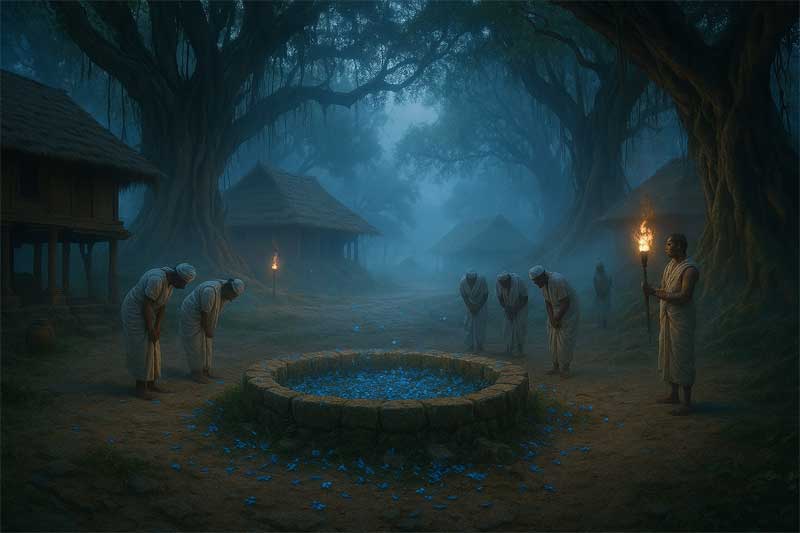अध्याय की शुरुआत — गाँव की वार्षिक पूजा
तूलू भूमि के कांतरा गाँव में हर साल एक भव्य पूजा उत्सव होता था, जिसे दैवत संकल्प दिवस कहा जाता था।
इस दिन गाँव के सभी लोग — किसान, मछुआरे, स्त्रियाँ और बच्चे — जंगल के बीच स्थित पुराने देवकुंड (पवित्र कुएँ) के पास एकत्र होते थे।
कहा जाता था कि यह कुआँ साधारण नहीं था —
यह पंजुरली दैव की ऊर्जा का द्वार था।
जब गाँव के लोग मिलकर भूत कोला करते,
तो उस कुएँ से रहस्यमयी नीली अग्नि की लपटें उठती थीं —
मानो धरती का हृदय जाग रहा हो।
पूजा का आरंभ – शक्ति का जागरण
जब ढोलकें बजने लगीं, और पुजारी ने मंत्रोच्चार किया,
तब देवकुंड का पानी धीरे-धीरे चमकने लगा।
गाँववाले श्रद्धा से कहते —
“पंजुरली आया है… धरती की आत्मा जाग उठी है…”
फिर गाँव का भूत कोला करने वाला व्यक्ति,
दैवत का वेश धारण करता, और नाचते-नाचते अचानक रुकता।
उसकी आँखों से ज्वाला जैसी चमक निकलती,
और उसके हाथ देवकुंड के पानी को छूते ही
नीली ऊर्जा का गोला आकाश में उठता!
वह गोला धीरे-धीरे घूमता हुआ उसी कुएँ में उतर जाता,
और हवा में एक गूँज सुनाई देती —
“धरती शुद्ध हो गई है…”
यह दृश्य देखकर गाँव के बच्चे और वृद्ध दोनों आँसू भर लेते,
क्योंकि उन्हें पता था कि यह दैवत की उपस्थिति का संकेत है।
अदृश्य कुएँ का रहस्य
लेकिन इस कथा का सबसे अद्भुत हिस्सा यही था —
अगले दिन वह कुआँ गायब हो जाता!
जहाँ कल पानी और चमक थी,
आज केवल सूखी मिट्टी और कुछ नीले पंखुड़ियाँ रह जातीं।
गाँव के बुजुर्ग कहते —
“देवकुंड स्थायी नहीं है,
वह तभी आता है जब धरती शुद्ध होती है।”
यह कुआँ हर बार अलग स्थान पर प्रकट होता —
कभी मंदिर के पास, कभी जंगल के बीच,
कभी किसी किसान के खेत में।
कहा जाता था कि यह दैवत की शक्ति का चलायमान स्वरूप है —
वह जहाँ अन्याय या अशुद्धि होती,
वहाँ प्रकट होकर उसे संतुलित करता।
🕉️ दैवत का शाप
एक बार, गाँव के कुछ लालची लोगों ने सोचा —
“यदि हम उस कुएँ से पानी निकालकर बेच दें,
तो हम अमीर बन जाएंगे।”
उन्होंने आधी रात को पूजा स्थल पर जाकर
कुएँ से पानी खींचना शुरू किया।
लेकिन जैसे ही उन्होंने रस्सी डाली,
एक भयंकर गर्जना हुई —
धरती हिली, हवा थम गई, और कुआँ अचानक अंधेरे में समा गया।
उन लोगों के कानों में आवाज़ गूँजी —
“दैव का जल, धन नहीं है;
जो उसे बेचता है, अपने जीवन का संतुलन खो देता है।”
अगली सुबह वे तीनों आदमी पागलपन में गाँव के बाहर भटकते मिले।
उसी दिन से गाँव ने शपथ ली कि
कभी कोई देवकुंड का पानी नहीं छुएगा।
पुनर्जन्म और नई आस्था
कई वर्षों बाद, जब नया पीढ़ी आई,
तो भूत कोला की परंपरा फिर शुरू हुई।
लोगों ने जाना कि देवता का संदेश स्पष्ट है —
“जहाँ श्रद्धा है, वहाँ शक्ति है।
जहाँ लालच है, वहाँ शाप है।”
देवकुंड फिर से प्रकट हुआ,
पर इस बार उसका जल और भी अधिक उज्ज्वल था —
मानो वह गाँव की क्षमा स्वीकार कर चुका हो।
Kantara Tulu folklore story, Kantara true story, Kantara Devakund legend, disappearing well story, Tulu mythology, Panjurli Daiva story, Bhoota Kola ritual, Kantara moral story, Indian folk tales, Kantara legend explained, moralstory.in
कथा का संदेश (Moral)
- श्रद्धा से बढ़कर कोई शक्ति नहीं।
- दैवत्व का जल पवित्र है — उसका सम्मान ही जीवन का धर्म है।
- प्रकृति और देवता दोनों इंसान की नीयत पहचानते हैं।
- लालच हमेशा विनाश की जड़ है।
Kantara: Chapter 2 – The God’s Curse and the Disappearing Well
The Annual Festival of the Village
In the heart of the Tulu land stood Kantara village, surrounded by lush forests and sacred groves.
Every year, the villagers celebrated a divine ritual known as Daiva Sankalpa Utsav —
the day when the gods of the forest awakened to bless the land.
On this day, the people of Kantara gathered near an ancient well called Devakund,
a sacred spring believed to be the gateway of Panjurli Daiva’s energy.
The villagers said that when their prayers were pure, the water shimmered with light,
and a blue flame would rise from the depths —
a sign that the deity had accepted their devotion.
The Awakening of Power
As dusk fell, drums thundered, conch shells blew, and the air trembled with chants.
The priest invoked the deity’s name, and the surface of the Devakund began to glow.
Villagers whispered in awe,
-flow">“Panjurli has awakened… the spirit of the earth rises again.”
Then the Bhoota Kola performer, possessed by the deity,
danced around the sacred fire,
his body trembling as divine energy coursed through him.
Suddenly, he stopped, raised his hand, and touched the glowing water —
and a radiant sphere of blue light lifted from the well, swirling toward the sky.
The air vibrated with a celestial hum as the energy slowly sank back into the water,
and a voice echoed faintly through the trees:
“The earth is purified once more.”
Tears streamed down the faces of the villagers —
for they knew the god had blessed them again.
The Mystery of the Disappearing Well
But what made this ritual legendary was the miracle that followed —
the well vanished the next day.
Where once stood a glowing sacred spring,
there was now only soft soil and a few blue petals scattered on the ground.
The elders explained,
“The Devakund is not bound to one place.
It appears only where the land is pure and hearts are sincere.”
Each year, the well would reappear in a new spot —
sometimes near the temple, sometimes deep in the forest,
and sometimes even in a farmer’s field.
The people believed that the Devakund was the moving form of divine balance —
it appeared wherever injustice or greed threatened the natural order,
to restore harmony and peace.
🕉️ The God’s Curse
But one year, greed crept into the hearts of a few villagers.
They whispered,
“If we take the sacred water and sell it,
we will become rich and powerful.”
So at midnight, they crept to the Devakund with ropes and buckets.
As soon as the rope touched the water,
a terrifying roar shook the forest.
The ground trembled, torches went out, and the well began to sink into the earth.
A thunderous voice echoed,
“The water of the Daiva is not for trade.
He who sells purity shall lose his peace.”
By dawn, the men were found wandering the forest in madness —
eyes hollow, minds lost.
From that day, the villagers swore never to touch the sacred water again,
except in devotion.
Rebirth of Faith
Years later, as generations changed,
the Bhoota Kola festival returned with new spirit.
People once again danced, sang, and prayed before the sacred site.
And that year, the Devakund appeared again —
its waters glowing brighter than ever,
as if the deity had forgiven them.
A soft voice whispered through the forest breeze,
“Where there is faith, there is power.
Where there is greed, there is darkness.”
From then on, the villagers treated every drop of water,
every tree, and every grain of soil
as part of Panjurli’s living presence.
Moral of the Story
- Faith is the true source of power.
- The divine belongs to devotion, not to greed.
- Nature and gods recognize the purity of the human heart.
- Those who respect the sacred are protected; those who exploit it are cursed.



